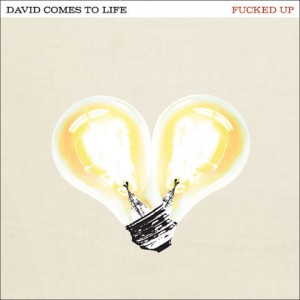Jeff Wilde
Help Press arrange’s New Memory to Vinyl

Below, you can watch Malcom’s Kickstarter announcement video and also listen to a sampler of New Memory.
Review: Artifex Pereo – Ailments and Antidotes
Artifex Pereo – Ailments and Antidotes
Released: July 23, 2011
Label: Unsigned
Purchase: iTunes
Over the past several years, a new species of alternative rock has emerged, characterized by bands that embody a “technical-meets-catchy” approach to making music. Last year, several more high profile bands of this ilk released full lengths; Circa Survive‘s Blue Sky Noise, Tides of Man‘s Dreamhouse, and PMtoday‘s In Media Res all garnered strong critical and consumer reception. So perhaps it’s surprising that, thus far, similarly-styled albums have been so rare in 2011. Yet even so, Artifex Pereo‘s Ailments and Antidotes is an undeniable testament to the sub-genre’s well-being.
Ailments and Antidotes opens with “The Baker Act”, a track that demonstrates both the band’s musical aptitude and frontman Evan Redmon’s impressive vocal range. Arpeggiated guitar leads introduce Redmon’s high, emotive tenor, soon swirling into an ambient section complete with twinkling piano, before an organ glissando transitions the band back into high gear for the chorus. It’s the same “loud-soft-loud” formula many of these types of bands thrive on (and often over-utilize) but the execution and instrumentation is so precise that the track involves, rather than bores, the listener. The lyrics are really the only negative (albeit a minor one); Redmon emotes, “Your poison is the scent that saturates the air/Grab your clothes and head for the back door before the devil knows you were here”, and though poetically phrased, the sentiment is a bit trite. In fact it’s difficult not to recall Anberlin‘s “The Feel Good Drag” (“Your lips, your lies, your lust/Like the devil’s in your hands”), because the songs are so extremely thematically comparable.
The next three tracks are all heavier tracks, similar in sound to “The Baker Act”. Of these, it’s “Suburbanite Sprawl” which excels the most. The groovy guitar riffs are reminiscent of The Chariot in the noisier parts of the tune, and snaking bass fills and sychopated drumming demonstrate the rhythm section’s capability. Redmon is at his most versatile here, soaring into the upper reaches of his range with ease. However, at this point, due to the congruent sound of the first four tracks it’s easy for the listener to infer that the rest of the record will be more of the same.
But the catch is that such an assumption would be incorrect. The middle portion of the record focuses the band’s talents on much more ambient, softer tracks. It’s this that gives Ailments and Antidotes the variety so many albums of this manner (including Artifex Pereo’s own debut EP, Am I Invisible) lack. And what’s more, the added variety doesn’t at all detract from the quality of the record. Because, despite the difference between tracks like “Butcher Hands” and “Mrs. D” and tracks from the first, heavier section of the album, it’s clear that the same band composed this entire collection of songs. Not to mention that Artifex Pereo are more than competent at performing this softer sound. In fact, “Devil and Water” is probably the best song on the record, bringing to mind the ambient sections of Circa Survive’s Juturna with its noodling guitar lines. It doesn’t hurt that it’s also the lyrical apex of the record; Redmon tells of an unhealthy relationship, singing, “Loathing you proved to be inadequate, so I will love you in my sleep and this will be less of a burden on me.” It’s hardly a novel concept, but the word choice and vocal delivery cause the words to ring startlingly true.
Yet, perhaps in an effort to avoid boring listeners with a heavier musical taste, Artifex Pereo revert back to the sound found at the beginning of Ailments and Antidotes for the album’s closing two tracks. While neither are as memorable as “The Baker Act” or “Suburbanite Sprawl” both hold their own and finish the album nicely. It’s interesting that in a scene where so many bands utilize the “loud-soft-loud” formula to writing music, nary a single one has crafted an entire album in the same format, as Artifex Pereo have done here. And Ailments and Antidotes certainly proves it is a blueprint that, when followed by a skilled band, can be very successful.
8.5
Standout Tracks: “The Baker Act”, “Suburbanite Sprawl”, and “Devil and Water”
Note: Evan Redmon is no longer the vocalist of Artifex Pereo. You can check out a video of the band playing an acoustic version of “Edgar Suit” with his replacement, Lucas Worley, below.
Review: Fucked Up – David Comes to Life
Fucked Up – David Comes to Life
Released: June 7, 2011
Label: Matador Recordsl
Purchase: iTunes | Insound | Amazon
Fucked Up is a punk band with epic aspirations. And their recently released third full length album, David Comes to Life, only serves to further demonstrate Fucked Up’s ambition. Divided into four acts, it tells the story of David Eliade, a factory worker, and his lover Veronica Boisson’s scheme to construct a bomb and the aftermath of its early detonation; namely, Veronica’s death. Beyond that, it’s difficult to decipher the plot; to do so, one would have to spend extensive time analyzing the lyrics to each track. But as a listener who still doesn’t fully understand the intricacies of the story-line of this self-proclaimed “rock opera”, I can assure you that complete comprehension isn’t at all vital to enjoyment of David Comes to Life.
Besides the complicated lyrical aspects of the album, David Comes to Life isn’t an easy listen for another reason: its length. At eighteen tracks and seventy-eight minutes, the listener must be patient to easily manage a complete spin of the album in one sitting. Yet when in the right mood, one will find this album one of the most rewarding of the year.
Nearly the moment David Comes to Life commences, it’s apparent this is no ordinary punk album. Opener “Let Her Rest” is an instrumental track, decorated with twinkling piano and ambient noise. To some readers, that description might bring to mind post-rock. Yet the song is more accurately defined as a dramatic build, a preparation for what’s to come; as it progresses, the guitar lines slowly become more punk, more representative of the remainder of the album. In effect, the track’s purpose is to gradually accustom the listener to the sounds that follow.
The following track, “Queen of Hearts”, is the first we hear of Damian Abraham’s (A.K.A. Pink Eyes) snarl. It’s as ferocious as ever, yet Abraham seems to have improved his emotional range. It’s also the first we hear of Cults‘ Madeline Follin, who plays Veronica. The shimmery guitars grant the tune a bright feel and the dual narration is a unique storytelling technique. It’s certainly a standout and has the potential to become known as one of punk’s defining love songs.
The next three songs — “Under My Nose”, “The Other Shoe”, and “Turn the Season” — share lyrical similarities in that each mention “the other shoe”. In fact, it is the track named after that lyric which succeeds the most out of the three. Beginning with Follin’s cries of “Dying on the inside”, Abraham soon makes his most tortured appearance, yelping, “It can’t be comfortable when the whole thing’s about to fall.” Far and away, this is the most poignant moment on the album. An unrelated but significant side-note is that Abraham also declares that “The new lyrics follow the same old meter.” And interestingly enough, many of Abraham’s lyrics throughout the album do follow similar rhythmic patterns. But this only serves to further the cohesiveness — characterized not only by the aforementioned but similar guitar tones and song structures as well — of David Comes to Life.
That concludes the album’s first, and arguably strongest, act. Its second, however, is by no means bad. “Running on Nothing” is the highlight, with its catchy 50’s rock guitar riffing, and “A Slanted Tone”, with its brief acoustic guitar intro, is another solid tune and one of David Comes to Life‘s fastest. Despite all this, it is here and in the third act where the album drags most. It’s simply due to a couple of lesser (but still good) tracks which don’t help distract the listener from the album’s length. Yet despite the bit of unevenness in the second and third acts, it’s impossible to penalize Fucked Up too heavily, because there is just so much to explore. And because of that, David Comes to Life is an album with unquestionable lasting value.
The fourth and final act is probably the second best of the four. Its only real fault is that “One More Night” is so good that closer “Lights Go Up” is a bit of a letdown. Yet the positives of “One More Night” far outweigh the negatives of the track’s placement. It’s truly an anthem. Soaring guitar lines complement accented drumming and Abraham’s violent, defiant bark until Abraham’s shouts of “I don’t wanna be right / Just one more night” enter the mix and the guitars are left to ring out. It feels so much like the album’s conclusion; perhaps that’s why “Lights Go Up” is disappointing, merely because the listener doesn’t want to hear anymore of anything. But that’s a small price to pay for such a well-conceived album by one of the best bands operating in punk music.
8.7
Standout Tracks: “Queen of Hearts”, “The Other Shoe”, “Running on Nothing”, and “One More Night”
Deep Elm Records – Like Their Facebook to Get Free Music!
Deep Elm Records will give away one record per week for the rest of the year if their Facebook page gets 2,000 likes by July 15. They’re at 1,882 so let’s finish it off for the sake of free music!
Review: Arrange – Plantation
Arrange – Plantation
Released: May 17, 2011
Label: N/A
Purchase: Insound | Bandcamp
Some albums are truly a cinematic experience. While perhaps this descriptor is most often relegated to concept albums, Arrange‘s Plantation proves such should not always be the case. For Plantation, created by Floridian Malcom Lacey, unfolds itself song by song much like a film does scene by scene. And also much like a movie, the listener discovers something previously unnoticed (and therefore unappreciated) with each replay. Thus, Lacey has achieved with Plantation what most artists cannot in a career: to create an album that betters itself with each listen.
It is the subtleties which ultimately set Plantation apart from any other album released thus far this year. One need only listen to the first track, “In Old Theaters”, to notice Lacey’s meticulous attention to detail. The song commences with a gradually building wave of white noise, soon awash in buried piano lines, that crashes into electronic, and later piano, melodies bolstered by prominent percussion. It’s incredibly full; if anything more were added, it would only serve to inundate the track, detracting from its quality. Yet it’s also an understated musical gesture; it’s dramatic but not melodramatic. And that’s precisely why it’s such a beautiful moment.
It’s also not an isolated one. Throughout Plantation, Lacey weaves melodic hooks in and out of the proverbial fabric of each song. Whether it be the synthesized horn entrance in the closing refrain of “Turnpike” or the catchy guitar riff that concludes “When’d You Find Me?”, each added theme contributes a new layer of texture to the track. But these layers aren’t simply stacked upon one another; instead, they intermingle. This counter-melodic interaction showcases Lacey’s songwriting ingenuity; it’s incredible how natural each song sounds considering the complexity.
What strikes the listener first, though, aren’t the musical intricacies of Plantation, but the raw emotion that so pervades the album. “Tearing Up Old Asphalt”, with its haunting piano and heart-wrenching lyrics, is a shining example of this. Lacey intones,”We were young/Kept runnin’ our mouths ’til he tore out our tongues/Didn’t hurt like anything”, his voice shaking as he narrates the story. “Melancholy” isn’t a strong enough adjective to describe the song. It’s tear-inducing.
“Medicine Man” infuses this sadness with fury. Because of this combination, it’s undoubtedly the most affecting track on an album overflowing with feeling. Lyrically, Lacey is devastating, promising, “I am a medicine man/Bring me your colors just to fix them for you”. Yet the narrator, perhaps Lacey himself, has a revelation, realizing that he cannot heal the subject without hurting himself and declares, “I’m not a medicine man/Don’t bring me your colors just to fix them…/I’ll fucking tear you up”. The contrasting sentiment here is profoundly moving, almost frightening. One must wonder exactly what occurred to cause the narrator’s change of heart, but perhaps the brilliance of the lyric lies in that uncertainty.
As the final strains of instrumental closer “Orange Glow (Thank You For the Night)” ring out, one cannot help but picture the credits scrolling down a blank movie screen. Lacey’s — who amounts to the album’s entire crew, acting as writer, producer, and director — final track seems to express gratitude to the listener for givingPlantation their time. It’s an appreciation revealed by both the title and the warmth of the song. The subtle irony here is that anyone who has the pleasure of listening to Plantation has witnessed something incredible and potentially life-changing. Really, it’s Lacey who should be thanked, rather than the listener, for introducing something so indescribably important to music itself.
9.7
Standout Tracks: “When’d You Find Me?”, “Turnpike”, “Tearing Up Old Asphalt”, and “Medicine Man”
You can download the album for free or purchase a physical copy on his Bandcamp page here.
Review: Balance and Composure – Separation
Balance and Composure – Separation
Released: May 10, 2011
Label: No Sleep Records
Purchase: iTunes | Insound | Amazon
Fans of Balance and Composure have been eagerly awaiting a full length release for quite some time now. After releasing two mature EPs and arguably the better side of a split with Tigers Jaw over the last three years, Balance and Composure finally appeased fans with news of Separation, comprised of twelve tracks.
Upon first listen, however, it’s quite possible avid followers of Balance and Composure will be disappointed. Moving towards a more streamlined sound definitely contributed to a loss of “oomph” and raw emotion from the band’s music. However, this more concentrated approach does give Separation a sense of cohesiveness and focus, attributes vital to a successful album.
Separation excels most on songs where Balance and Composure’s 90’s influences are the most apparent. “Stonehands” delivers in this aspect, showcasing both emo and grunge influences, though vocalist Jon Simmons tends to sing a bit nasally especially on words with “long e” vowels. A better culmination of 90’s style and Simmons’ vocal performance is the title track. On the chorus, Simmons utilizes his perfected “sing scream”, a gritty yell, but with definitive pitch. It’s a technique Jesse Lacey of Brand New and Andy Hull of Manchester Orchestra also use, though Simmons’ style feels more passionate.
As a whole, though, Separation seems like more of a turn towards alternative rock. While Balance and Composure do perform this genre with ease and more than competently (take the southern rock vibe of “Galena” or grit and angst of “I Tore You Apart In My Head” for instance), at times the record leans toward typicality, most notably on “Void”, an unfortunate pick for an album opener.
The loss of emotional immediacy might be due in part to the album’s generally flat production. Producer Brian McTernan’s past work has been inconsistent, dipping especially on Emarosa‘s latest self-titled release. WhileSeparation is definitely an improvement for McTernan, the drums sound tinny and lack tone and it’s nearly impossible to tell the band has three guitarists. The production just doesn’t feel as dynamic or raw as a band like Balance and Composure, one who thrives on straddling the crossroads of technicality and passion, needs to fully excel.
However, after multiple listens, Balance and Composure’s passion permeates McTernan’s iffy producing job. Tracks like album standout “Patience” exude intense feeling in the music. Balance and Composure mean every lyric, every guitar strum, every bass line, and every snare hit. Though perhaps Separation only fully demonstrates this with the listener’s patience (yes, I went there), the album isn’t a regression from past work. Balance and Composure is still miles ahead of most other bands operating in their genre. The reason?
Authenticity.
7.7
Standout Tracks: “Patience”, “Galena”, and “I Tore You Apart In My Head”
Interview: Balance and Composure
Balance and Composure vocalist/guitarist Jon Simmons took some time out of his busy schedule to answer a few questions. Having recently released Separation through No Sleep Records, the band is beginning to become very well known in the current music scene. Simmons talked about the response to the new record, upcoming tour plans, and the bands he supports. Check out the full interview below.

Jon Simmons – Vocals/guitar
Andy Slaymaker – Guitar/vocals
Erik Petersen – Lead guitar
Matt Warner – Bass
Bailey Van Ellis – Drums
LitS: You guys just released your first full length, Separation, on May 10. What has the fans’ response been like so far?
The fans’ response has been unreal so far. We couldn’t be happier with the reaction or the fact that our fans are so supportive by telling other people about the record. It is rare that I post about certain records people should check out, so the fact that so many fans have posted or spread the word about it is amazing to me. We feel pretty lucky to have such great supporters.
LitS: What was the recording experience like for you guys? Was it at all stressful?
Recording will always be stressful no matter what, but this was our easiest experience in the studio. We got to do what we always dreamed of doing, which was having a lot of time to experiment and record. We worked with Brian McTernan, and he really helped us grow as a band and as songwriters. We couldn’t have asked for a better producer for our first full length. (more…)
Recommended: Maybeshewill
Maybeshewill
For Fans Of: 65daysofstatic

Their newest album, I Was Here For A Moment, Then I was Gone, released May 30th of this year, continues the sonic progression of their last few releases, leaving the listener to bask in the somber heaviness and more subdued, melancholic moments that prevail throughout the ten tracks. Good for those chill-out moments at home when surfing the web on sites like PartyPoker España or social networking.
Listen to “Red Paper Lanterns” here:





Connect